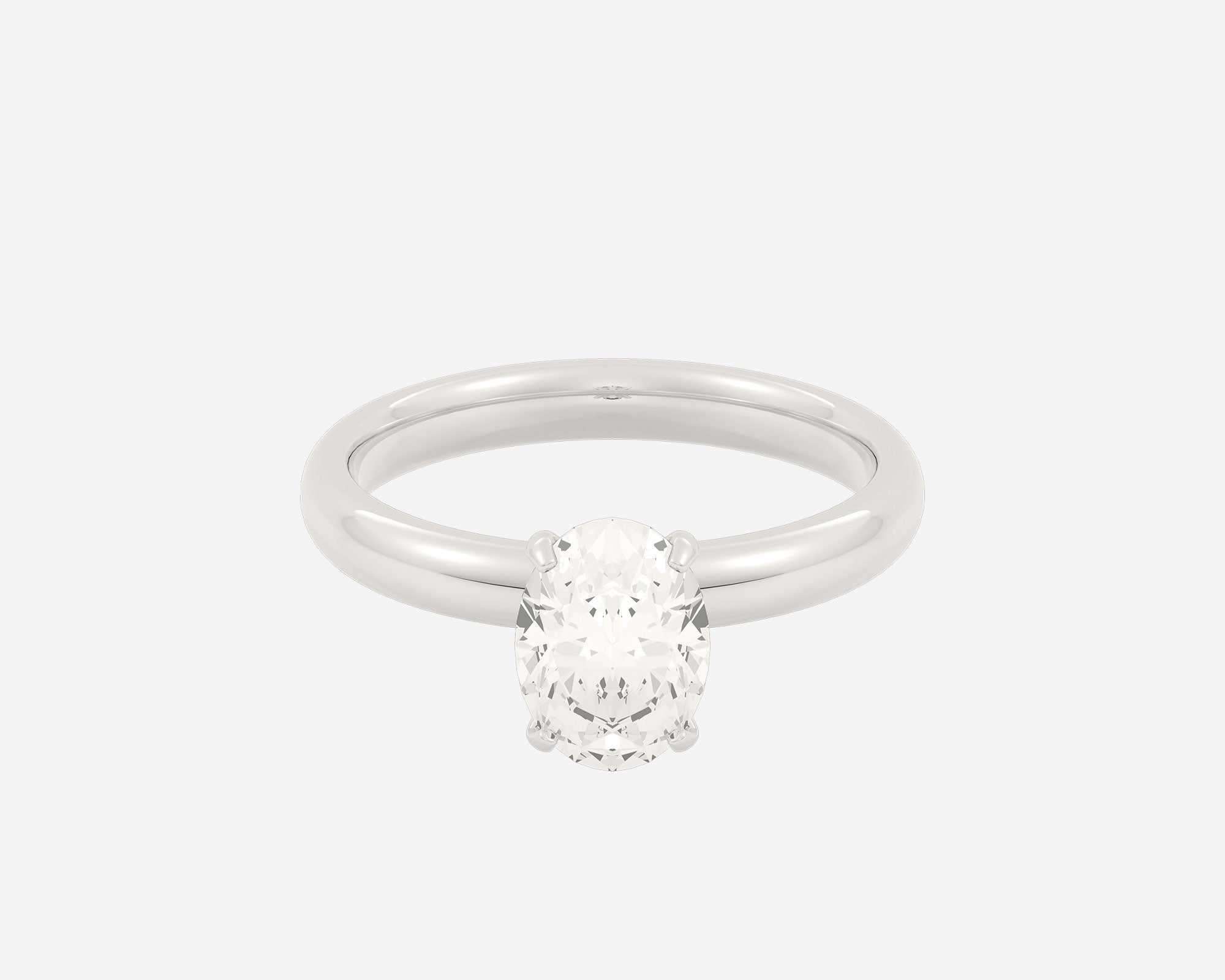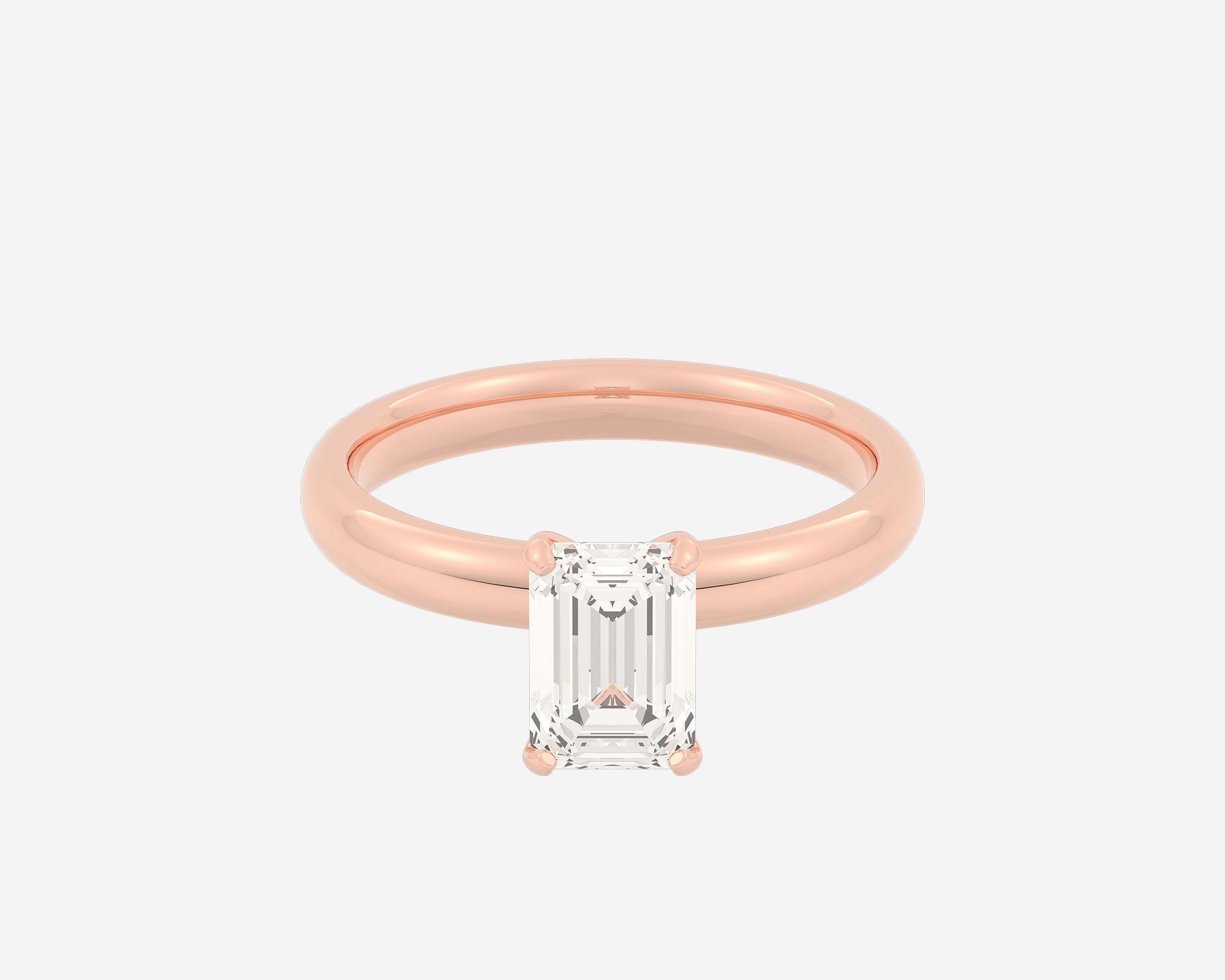Planning to pop the question but don’t know diamonds? We’re walking you through the diamond shapes that are featured in today’s most popular solitaire engagement ring styles. If you’re looking for an engagement ring without a solitaire center stone, check out our collection of wedding and engagement ring bands.
Round
A classic for a reason, a round cut diamond is known for having some of the most shine of any diamond shape. With 58 facets, round diamonds are typically seen in a “brilliant” cut, which maximizes a diamond’s brilliance and gives the stone excellent fire.
In order to create a brilliant round cut diamond, 50% or more of the original stone needs to be cut away. Because so much of the stone is lost, a round diamond is the most expensive of any diamond shape. The high price point hasn’t deterred its popularity, however: 75% of the world’s diamonds are round brilliant cuts.
When searching for a round cut diamond, the most important of the four C’s to keep in mind is cut quality. If your diamond is cut properly, it will exhibit lots of sparkle and brilliance, which will conceal any small inclusions!

Oval
The oval shaped diamond, essentially an elongated brilliant cut, was introduced in the mid-1900s. This shape is meant to represent the longevity of the wearer’s relationship (and also happens to accentuate the length of their finger). Symmetry is extremely important for an oval cut diamond, which features heads (rounded ends), shoulders, and a flat belly in the center. This diamond is also durable, making it a great choice for a fancy shaped diamond with no pointed edges among different diamond cuts.
Because of its elongated shape, an oval diamond looks bigger than a round diamond or other diamond cuts of the same carat weight. The rounded ends of this diamond tend to show color - make sure your diamond’s color grade is high for a colorless effect. This diamond shape also has a tendency to show flaws and inclusions, so make sure you’re opting for a diamond with a good clarity grade.

Emerald
This art-deco style diamond rose to prominence in the 1920s and remains popular to this day. Emulating the way emeralds grow naturally, this rectangular shape features a prominent table and large step cut facets. Because this cut features fewer facets than a brilliant cut diamond, this mirror-like diamond is more elegant, minimalist than flashy, and one of the most refined diamond cuts available.
Clarity and color are important to prioritize when choosing an emerald diamond, as the stone’s minimalist silhouette draws attention to any inclusions in the stone. That said, emerald stones tend to be less expensive compared to other diamond shapes due to their relatively simple cut pattern.

Cushion
Created in the 18th century and nearly ubiquitous by the 19th century, a cushion cut is one of the most popular vintage stone shapes. Before jewelers had the technology to cut a perfectly round diamond, a cushion cut stone was as close as they could get. A cushion cut diamond typically has 58-64 facets, many of which are featured at the crown of the diamond. The corners of this stone are rounded, giving it a pillow-like appearance.
One of the biggest benefits of a cushion cut diamond is that it tends to be a less expensive diamond shape. Cushion cut diamonds do tend to show color more than other shapes, so you may want to prioritize color over the other C’s. While a cushion cut stone doesn’t have as much brilliance as a round diamond, its varied facets give the shape incredible fire.

Asscher
Invented in Holland in 1902 by Joseph Asscher, this shape came back into the foreground in the early 2000s thanks to Sex and the City when Aidan (spoiler!) proposes to Carrie with an Asscher diamond engagement ring. With larger facets and a higher crown than an emerald cut, an Asscher cut diamond emits a hall of mirrors effect while maintaining the minimalist and vintage feel of an emerald stone. This shape is almost octagonal due to its cut corners - and its deep facets create a lovely X shape when viewed from above.
Because an Asscher stone has a large table that emphasizes the center of the stone, blemishes can be noticeable, so it’s important to prioritize clarity while selecting your stone.

Marquise
With curved sides and two pointed ends, the marquise cut diamond is named after the smile of the Marquise de Pompadour, King Louis XIV’s mistress. That said, you can always picture an eye or a football if French history wasn’t your strongest subject in school. Because the body of this stone is so long, this diamond shape looks bigger than its actual carat weight. The elongated body of the stone also makes the wearer’s finger look longer and more slender.
When selecting a marquise stone for your diamond ring, the stone’s symmetry is the most important factor given its distinctive shape. Once you’ve selected a loose diamond, be sure to select a setting that protects your diamond’s pointed ends!

Pear
Also known as a teardrop diamond, the pear shaped diamond dates back to the 1400s and has regained popularity in recent years. Pointed on one end and rounded on the other, this shape is a mix between a marquise and an oval cut diamond. With 58 facets, a pear cut diamond maximizes sparkle. Often, the pointed end will point towards the heart of the wearer (but we don’t believe in rules - feel free to point your stone towards your partner’s heart if you’d like!).
If you’re looking for a large-looking stone, you’ve come to the right diamond: a pear shaped stone looks bigger than a round cut stone of the same carat. Contemporary pear cut diamonds also tend to have more facets than they used to, leading to much higher brilliance. No matter how you orient your pear shaped diamond, be sure that the diamond’s setting has a prong to protect the tip of the stone from chipping.

Princess
Introduced in the 1980s, the princess cut diamond is traditionally the second most popular diamond cut. When viewed from above, this stone looks square, but when studied from the side you’ll notice an inverted pyramid shape with beveled sides. Because a princess cut diamond incorporates 80% of the rough diamond, it’s considered by some to be one of the more environmentally friendly diamond shapes.
With 57-58 facets, a princess cut diamond conceals small inclusions and shadows, meaning you can go with a slightly lower grade diamond as far as clarity and color go. When choosing a setting to pair with your stone, put that princess in the right castle: select a setting that protects the corners of your princess stone, as its sharp edges are prone to chipping if they’re not properly fortified.

Radiant
With 70 facets, a radiant cut diamond is considered by many to be the most dazzling of all the diamond shapes. Introduced in 1977, this stone combines the brilliance of a round cut with the purity of an emerald cut diamond. While it appears similar in shape to an emerald cut diamond, the extremely deep and varied facets of a radiant diamond give the stone remarkable sparkle.
As far as carat goes, the signature deep cuts in a radiant cut diamond tend to make the stone look smaller than a different shape of the same carat weight. That said, you don’t have to worry too much about color or clarity for this diamond because there are so many facets and angles in the stone’s pavilion and crown.

Questions? Give us a shout at help@hiholden.com or a ring (pun intended) at 646.722.6817.
FAQs
1. What are the most popular diamond shapes for engagement rings
Round, oval, cushion, and emerald are among the most popular diamond shapes. Round brilliant cuts lead the way for their timeless sparkle, while fancy shapes like oval or marquise offer unique character.
2. Which diamond cuts sparkle the most?
Brilliant cuts—especially round brilliant, radiant, and princess—are designed to maximize sparkle and brilliance due to their multiple facets and precision.
3. What are the best diamond cuts to make a stone look bigger?
Oval, marquise, and pear are popular diamond shapes for appearing larger than their actual carat weight due to their elongated silhouettes.
4. How do I choose between different diamond cuts?
Choosing the right cut depends on your style and priorities. If you want intense sparkle, opt for brilliant cuts. If you love clean lines and vintage elegance, step cuts like emerald or asscher may be best.
5. Which diamond shape is most durable for everyday wear?
Round, cushion, and oval diamonds are durable due to their lack of sharp edges. Princess and marquise cuts require extra protection at their pointed tips.
About Holden
Modern love deserves modern symbols. That’s why at Holden, we specialize in made-to-order engagement and wedding rings designed for the love you actually live. We center inclusivity and ethics in everything we do. Explore clean, architectural Signet Rings, radiant Gemstone rings, and heirloom-worthy Classic bands that speak to your story—not anyone else's.
